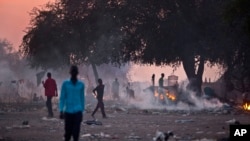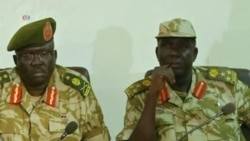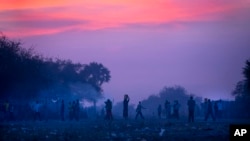Delegates from the warring sides in South Sudan met separately Friday with African mediators to lay the ground rules for face-to-face negotiations to end nearly three weeks of violence that has killed at least 1,000 people in the world's newest nation.
But even as the negotiating teams for South Sudanese President Salva Kiir and his rival in the conflict, former Vice President Riek Machar, met in Addis Ababa with mediators from the Intergovernmental Authority on Development (IGAD), fighting continued in South Sudan.
Hundreds of thousands of civilians have fled their homes as clashes raged between rebel forces loyal to Machar and government troops.
The rebels, who control the two oil-producing states of Unity and Upper Nile and this week recaptured Bor, the capital of Jonglei state, have said they are poised to march on Juba, around 200 kilometers to the south, while army General James Hoth Mai said government forces were advancing toward Bor to take on the rebels.
"We don't yet have a ceasefire... and we don't want them to come and get us somewhere here so we have to go to them," Hoth Mai said.
A U.N. spokesperson in New York said anti-government troops were seen around Bor on Friday, and that fighting was still ongoing in Upper Nile state. Citing officials from the U.N. Mission in South Sudan (UNMISS), the spokesperson said the security situation also remained "volatile" in Unity state, especially in Mayom county.
UNMISS said Tuesday it has "mounting evidence" that serious human rights abuses, including extra-judicial killings of civilians and captured soldiers, massive displacements and arbitrary detentions, often on ethnic grounds, have been committed in South Sudan since the unrest began on Dec. 15 when renegade army troops attacked the army headquarters in Juba.
Kiir said the violence was a coup bid, orchestrated by Machar, a claim the former vice president has denied.
Within days, the violence had spread around the country and taken on ethnic overtones, with reports of people being singled out and killed because they were members of Kiir's Dinka ethnic group, or ethnic Nuer, like Machar.
Ugandan Foreign Ministry spokesman Fred Opolot said IGAD mediators will push for a cessation of hostilities in South Sudan to be "one of the ground rules" for the peace talks in Addis Ababa, but said he was not sure how long it would take to get through the preliminary round of talks that began Friday.
"Before any substantive talks begin, we have to lay the ground rules," Opolot said.
"I'm pretty sure that a ceasefire will be one of the ground rules... But the ground rules may take a few days" to agree to, he said.
IGAD, which was a key player in brokering the 2005 peace agreement that ended Sudan's long civil war, which resulted in the birth of South Sudan in 2011, will be the "key facilitator" at the talks in Addis Ababa, Opolot said.
As the two sides moved toward face-to-face peace negotiations, the United States evacuated most of the remaining personnel from its embassy in Juba and urged any U.S. citizens still in South Sudan to leave the country immediately, due to the "deteriorating security situation."
The Pentagon said that 20 Americans were evacuated from Juba to Entebbe in Uganda Friday and that two C-130 aircraft are "standing by for any further requests from the State Department" for help in South Sudan.
The United States and several European countries evacuated scores of their citizens from South Sudan in the days immediately following the outbreak of violence.
U.S. Ambassador to South Sudan Susan Page is still in Juba and will maintain "constant communication" with South Sudanese officials, UNMISS and her foreign counterparts, the State Department said in a statement.
The U.S. Embassy in Nairobi will provide consular services for U.S. citizens who choose to stay in South Sudan while the embassy in Juba is closed. The statement did not say how long that would be.
Even as the United States drew down its embassy staffing in Juba, Washington announced a new injection of nearly $50 million in aid to help address the humanitarian crisis in South Sudan, where U.N. officials have said the numbers of displaced persons could leap to 400,000 if a peace deal is not reached in Ethiopia.
The monies "will for all intents and purposes be available immediately to our partners" on the ground in South Sudan, U.S. Deputy Assistant Secretary of State Elizabeth Hopkins told VOA News.
U.S. Special Envoy to Sudan and South Sudan, Donald Booth, was in Addis Ababa Friday for the start of the peace talks, she said.
He and Secretary of State John Kerry "continue to urge President Kiir and former Vice President Machar to reach an immediate cessation of hostilities, most importantly allow full and unfettered humanitarian access, and to work to resolve their differences peaceful and democratically," Hopkins said.
"We remain very committed to peace and stability in South Sudan," she said.
The United Nations said that aid agencies in South Sudan are scaling up their work, especially in towns that have been struck by violence and in rural sites where civilians have sought safety.
“The largest site of civilians was in Awerial, Lakes State, where up to 76,000 people have gathered,” Jens Laerke of the U.N. Office for the Coordination of Humanitarian Affairs (OCHA), told reporters in Geneva on Friday.
Laerke said aid agencies are providing food, non-food items and basic healthcare in Awerial, and are stepping up efforts to make clean water and latrines available.
But even as the negotiating teams for South Sudanese President Salva Kiir and his rival in the conflict, former Vice President Riek Machar, met in Addis Ababa with mediators from the Intergovernmental Authority on Development (IGAD), fighting continued in South Sudan.
Hundreds of thousands of civilians have fled their homes as clashes raged between rebel forces loyal to Machar and government troops.
The rebels, who control the two oil-producing states of Unity and Upper Nile and this week recaptured Bor, the capital of Jonglei state, have said they are poised to march on Juba, around 200 kilometers to the south, while army General James Hoth Mai said government forces were advancing toward Bor to take on the rebels.
"We don't yet have a ceasefire... and we don't want them to come and get us somewhere here so we have to go to them," Hoth Mai said.
A U.N. spokesperson in New York said anti-government troops were seen around Bor on Friday, and that fighting was still ongoing in Upper Nile state. Citing officials from the U.N. Mission in South Sudan (UNMISS), the spokesperson said the security situation also remained "volatile" in Unity state, especially in Mayom county.
UNMISS said Tuesday it has "mounting evidence" that serious human rights abuses, including extra-judicial killings of civilians and captured soldiers, massive displacements and arbitrary detentions, often on ethnic grounds, have been committed in South Sudan since the unrest began on Dec. 15 when renegade army troops attacked the army headquarters in Juba.
Kiir said the violence was a coup bid, orchestrated by Machar, a claim the former vice president has denied.
Within days, the violence had spread around the country and taken on ethnic overtones, with reports of people being singled out and killed because they were members of Kiir's Dinka ethnic group, or ethnic Nuer, like Machar.
IGAD Will Push for Ceasefire at Peace Talks
Ugandan Foreign Ministry spokesman Fred Opolot said IGAD mediators will push for a cessation of hostilities in South Sudan to be "one of the ground rules" for the peace talks in Addis Ababa, but said he was not sure how long it would take to get through the preliminary round of talks that began Friday.
"Before any substantive talks begin, we have to lay the ground rules," Opolot said.
"I'm pretty sure that a ceasefire will be one of the ground rules... But the ground rules may take a few days" to agree to, he said.
IGAD, which was a key player in brokering the 2005 peace agreement that ended Sudan's long civil war, which resulted in the birth of South Sudan in 2011, will be the "key facilitator" at the talks in Addis Ababa, Opolot said.
U.S. Evacuates More Embassy Staff
As the two sides moved toward face-to-face peace negotiations, the United States evacuated most of the remaining personnel from its embassy in Juba and urged any U.S. citizens still in South Sudan to leave the country immediately, due to the "deteriorating security situation."
The Pentagon said that 20 Americans were evacuated from Juba to Entebbe in Uganda Friday and that two C-130 aircraft are "standing by for any further requests from the State Department" for help in South Sudan.
The United States and several European countries evacuated scores of their citizens from South Sudan in the days immediately following the outbreak of violence.
U.S. Ambassador to South Sudan Susan Page is still in Juba and will maintain "constant communication" with South Sudanese officials, UNMISS and her foreign counterparts, the State Department said in a statement.
The U.S. Embassy in Nairobi will provide consular services for U.S. citizens who choose to stay in South Sudan while the embassy in Juba is closed. The statement did not say how long that would be.
U.S. Announces More Aid for South Sudan
Even as the United States drew down its embassy staffing in Juba, Washington announced a new injection of nearly $50 million in aid to help address the humanitarian crisis in South Sudan, where U.N. officials have said the numbers of displaced persons could leap to 400,000 if a peace deal is not reached in Ethiopia.
The monies "will for all intents and purposes be available immediately to our partners" on the ground in South Sudan, U.S. Deputy Assistant Secretary of State Elizabeth Hopkins told VOA News.
U.S. Special Envoy to Sudan and South Sudan, Donald Booth, was in Addis Ababa Friday for the start of the peace talks, she said.
He and Secretary of State John Kerry "continue to urge President Kiir and former Vice President Machar to reach an immediate cessation of hostilities, most importantly allow full and unfettered humanitarian access, and to work to resolve their differences peaceful and democratically," Hopkins said.
"We remain very committed to peace and stability in South Sudan," she said.
The United Nations said that aid agencies in South Sudan are scaling up their work, especially in towns that have been struck by violence and in rural sites where civilians have sought safety.
“The largest site of civilians was in Awerial, Lakes State, where up to 76,000 people have gathered,” Jens Laerke of the U.N. Office for the Coordination of Humanitarian Affairs (OCHA), told reporters in Geneva on Friday.
Laerke said aid agencies are providing food, non-food items and basic healthcare in Awerial, and are stepping up efforts to make clean water and latrines available.







